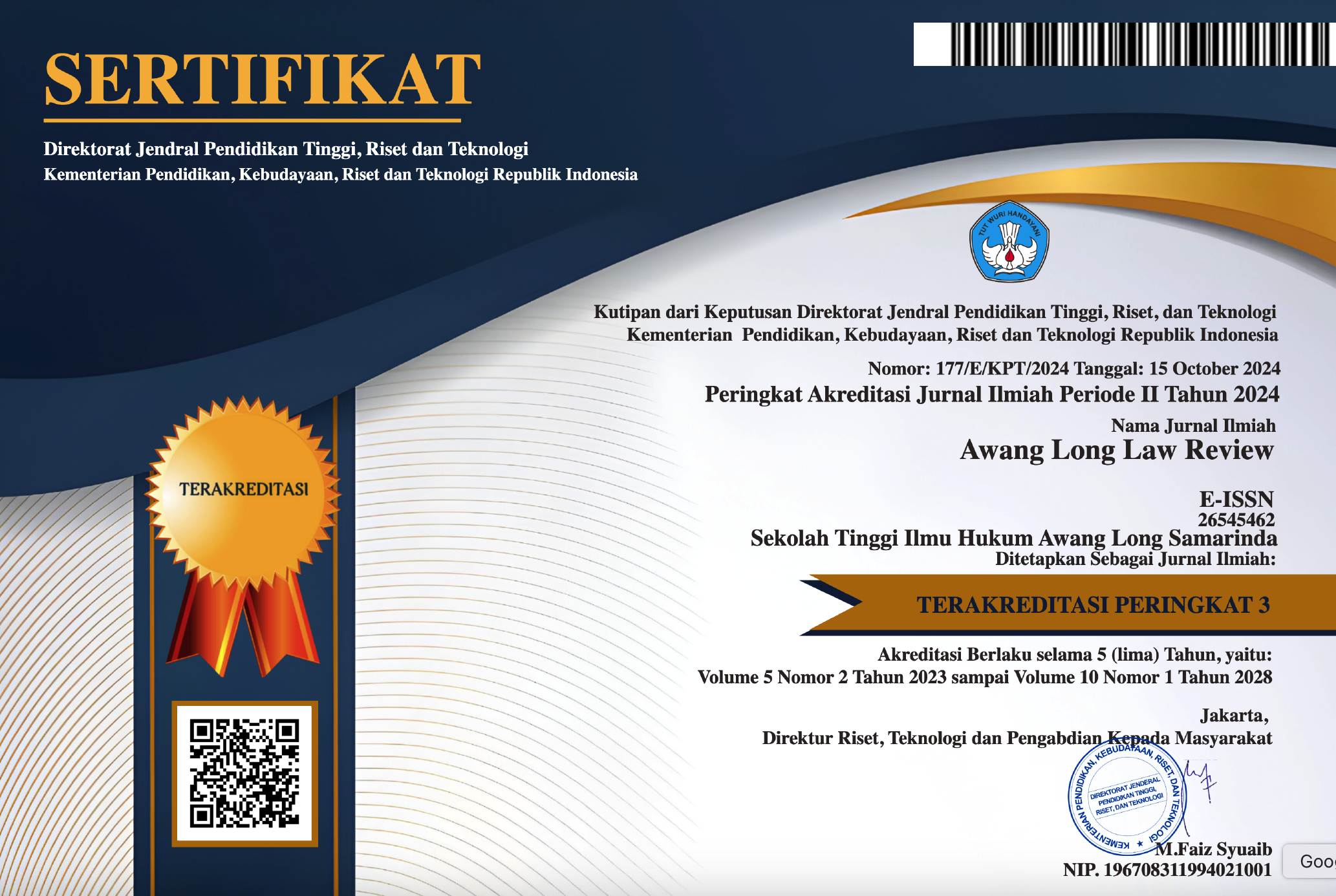LEGAL IMPLEMENTATION OF A DEED OF TESTAMENTARY GRANT IN CASES WHERE THE BENEFICIARY IS AN UNREGISTERED LEGAL ENTITY
Abstract
The Aim of this research is to identify the essential aspects that must be verified by a notary in the process of drafting a deed of testamentary gift, to ensure that an individual or legal entity meets the criteria as a beneficiary under the provisions of the Indonesian Civil Code. Furthermore, the research aims to gain a deeper understanding of the notary's responsibilities in carrying out duties related to testamentary deeds. The research method employed in this study is a normative juridical approach combined with empirical data, utilizing a conceptual approach, a statutory approach, and a case-based approach. The Novelty of this research lies in the confirmation that, under inheritance law, a legal entity may indeed be designated as a beneficiary of a will. However, in its implementation, certain documentation and clear legal status of the legal entity are required, as stipulated in the Indonesian Civil Code. The findings of this study, referring to the case concerning the deed of testamentary gift in Decision No. 52/Pdt.G/2020/PN.Bgr, indicate that the beneficiary of the will, a foundation, had been established and possessed Articles of Association but had not yet been officially approved by the Ministry of Law and Human Rights. As a result, the legal certainty regarding the foundation’s existence was brought into question. Consequently, the notary may be held administratively and civilly liable if their actions are deemed to fulfill the elements of an unlawful act as stipulated in Article 1365 of the Indonesian Civil Code. This research is conducted with the expectation that in the future that The notary must exercise greater diligence in drafting testamentary deeds and must fulfill all obligations related to their preparation as stipulated by law. This ensures that the testamentary deed created by the notary provides legal certainty and does not cause harm to any party.
Downloads
References
Anshori, A. G. (2009). Lembaga kenotariatan Indonesia: perspektif hukum dan etika.
Azed, A. B. (2005). Profesi Notaris sebagai Profesi Mulia. Jakarta: Media Ilmu.
BPK RI. (2005). Undang-undang (UU) No. 28 Tahun 2004 Perubahan atas Undang-Undang Nomor 16 Tahun 2001 tentang Yayasan. BPK RI. https://peraturan.bpk.go.id/Details/40703/uu-no-28-tahun-2004
BPK RI. (2014). Undang-undang (UU) No. 2 Tahun 2014 Perubahan atas Undang-Undang Nomor 30 Tahun 2004 Tentang Jabatan Notaris. BPK RI. https://peraturan.bpk.go.id/Details/38565/uu-no-2-tahun-2014
Hadjon, P. M. (1997). tentang Wewenang. Yuridika, 7(5–6), 20.
Kansil, C. S. T. (1979). Pengantar ilmu hukum dan tata hukum Indonesia. Jakarta: Balai Pustaka.
Kartikawati, D. R. (2021). Hukum waris perdata sinergi hukum waris perdata dengan hukum waris Islam. CV. ELVARetta Buana.
Laily, P. S. (2024). Pertanggungjawaban Notaris Sebagai Pembuat Akta Wasiat (Testament Acte) Yang Tidak Memenuhi Ketentuan Legitieme Portie. UNES Law Review, 7(1), 392–401.
Margono, H. (2019). Asas Keadilan, Kemanfaatan, dan Kepastian Hukum dalam Putusan Hakim.
Marzuki, M. (2017). Penelitian hukum: Edisi revisi. Prenada Media.
Meliala, D. S. (2018). Hukum Waris Menurut Kitab Undang-Undang Hukum Perdata. Nuansa Aulia.
Meutia, F. (2022). Pembatalan Akta Hibah Wasiat Dan Akibatnya Terhadap Pembagian Waris (Studi Putusan Mahkamah Agung Nomor 2665 K/Pdt/2019). Indonesian Notary, 4(2), 19.
Prodjodikoro, W. (1966). Hukum warisan di Indonesia. Bandung: Sumur Bandung.
Ramadhan, F., & Lukman, A. (2021). Pembatalan Akta Wasiat Yang Dibuat Notaris Berdasarkan Alat Bukti Resume Rapat Keluarga (Analisis Kasus Putusan Mahkamah Agung Nomor 1968 K/PDT/2018). Imanot: Jurnal Kemahasiswaan Hukum & Kenotariatan, 1(1), 118–141.
Salim, H. S., & Nurbani, E. S. (2014). Penerapan Teori Hukum Pada Penelitian Disertasi dan Tesis. PT Raja Grafindo Persada, Jakarta.
Subekti, S. H. (1978). Pokok pokok hukum perdata. Jakarta: PT. Intermasa.
Suparji, S. (2015). Transformasi Badan Hukum di Indonesia. UAI Press.
Syahrani, R. (1989). Seluk beluk dan asas-asas hukum perdata.
Copyright (c) 2025 Noviarasta Dewi Rositasari, Tjempaka Tjempaka

This work is licensed under a Creative Commons Attribution-ShareAlike 4.0 International License.







